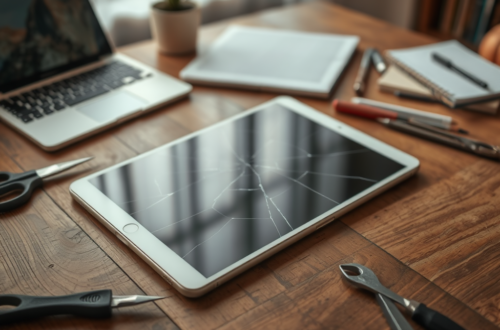In an era where smartphones and tablets are central to our daily lives, protecting the screens of these electronics has become a priority for many users. The choice between glass and plastic screen protectors typically raises some significant questions. While both options offer a level of protection, their differences could influence your user experience dramatically. Understanding these distinctions is crucial, especially when evaluating which type aligns best with your lifestyle. In this article, we’ll delve into each type of screen protector, discussing their advantages and disadvantages, and helping you make an informed decision.
The market for screen protectors has expanded, incorporating various materials and technologies to cater to users’ needs. Traditionally, the major contenders have been glass and plastic, each boasting unique properties. As you consider which option to choose, it’s essential to weigh factors like durability, clarity, and overall value. Whether you’re concerned about scratches, drops, or usability, understanding the characteristics of these protectors can help safeguard your investment. Let’s explore the various types of screen protectors available and discover which one may be the right fit for you.
What Are Screen Protectors?

Screen protectors are thin layers of material applied to the surface of electronic devices like smartphones, tablets, and even smartwatches. Their primary purpose is to shield screens from scratches, fingerprints, and other forms of damage. By acting as a barrier, these protectors can significantly extend the lifespan of your device’s screen. Most screen protectors are available in two predominant materials: glass and plastic. Each of these materials offers its own unique features, benefits, and drawbacks that may influence your choice.
Types of Screen Protectors

To better understand your options, let’s take a closer look at the two main types of screen protectors: glass and plastic. Each type caters to different preferences and requirements, allowing users to choose based on their specific needs. Below are brief descriptions of both types, highlighting their features.
Glass Screen Protectors
Tempered glass screen protectors are a popular choice among users who seek enhanced protection for their devices. Made from reinforced glass, these protectors provide superior resistance to scratches and drops. Here are some of the advantages of using glass screen protectors:
- High transparency, ensuring optimal screen clarity.
- Exceptional touch sensitivity, maintaining the original feel of the device.
- Enhanced durability due to added strength.
- Easy to install and remove without leaving residue.
However, glass screen protectors come with their set of disadvantages. They can be somewhat bulky and might add extra weight to the device. Additionally, while they provide excellent protection against impacts, they can shatter if dropped under extreme conditions. Understanding these pros and cons can help you decide if glass is right for you.
Plastic Screen Protectors
Plastic screen protectors, often composed of materials like PET (Polyethylene Terephthalate) and TPU (Thermoplastic Polyurethane), cater to users who seek flexibility and affordability. They are lighter and typically thinner than their glass counterparts. Here are some benefits of using plastic screen protectors:
- Flexibility allows for easier application on curved screens.
- Generally more affordable than glass options.
- Lightweight, which can be appealing for those who prefer minimal bulk.
- Good scratch resistance for everyday use.
On the downside, plastic protectors may not offer the same high level of impact protection as glass. They can also reduce screen clarity and touch sensitivity compared to glass options. It’s essential to weigh these factors based on your usage habits to determine the best fit for you.
Comparing Glass and Plastic Screen Protectors
To help visualize the unique characteristics of glass and plastic screen protectors, the following table outlines key differences:
| Feature | Glass Screen Protectors | Plastic Screen Protectors |
|---|---|---|
| Durability | High durability against impacts | Moderate durability; less impact resistance |
| Clarity | High transparency | Can be less clear |
| Touch Sensitivity | Excellent touch response | Good but can be affected |
| Cost | Typically higher | Generally lower |
As reflected in the table above, both glass and plastic screen protectors offer unique benefits. The choice between them often comes down to personal preference, weighing aspects such as price, protection level, and aesthetic. Understanding these attributes can aid in making an informed decision.
When to Choose Glass vs. Plastic
Determining the right type of screen protector can also depend on your specific lifestyle and usage scenarios. For those who frequently drop their devices or work in challenging environments, glass screen protectors may be more suitable. They provide robust coverage without compromising touch sensitivity, making them ideal for heavy users.
Conversely, if you’re someone who values lightweight options or has a tighter budget, plastic screen protectors can deliver satisfactory protection while being easier on your wallet. Additionally, if your device has a uniquely shaped screen, the flexibility of plastic protectors might present a compelling advantage. Consider your habits and the likelihood of damage when choosing the right protector.
Conclusion
In summary, choosing the right screen protector—whether glass or plastic—can significantly impact the longevity and functionality of your device. Each type brings unique advantages and drawbacks, aligning with various user preferences and lifestyles. It’s essential to analyze factors like durability, cost, and personal preference before making your decision. Remember, the ideal screen protector not only protects your device but enhances your overall user experience.
Frequently Asked Questions
- What is the main difference between glass and plastic screen protectors? Glass screen protectors offer superior durability and clarity, while plastic protectors are lighter and more affordable.
- Are glass screen protectors worth the extra cost? Yes, especially if you prioritize durability and touch sensitivity.
- Can plastic screen protectors provide adequate protection? Yes, but they may not be as protective against severe impacts as glass.
- How easy is it to install glass vs. plastic screen protectors? Both types can be installed by users, but glass protects better against installation mistakes due to its rigidity.
- Will a screen protector affect my device’s touchscreen functionality? Quality screen protectors, whether glass or plastic, should not hinder touchscreen functionality.





